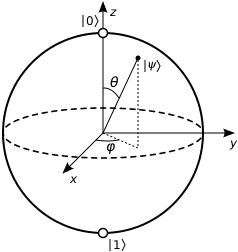Quantum Computing

A quantum computer is a computer that uses quantum mechanical phenomena in an essential way: it exploits superposed and entangled states, and the intrinsically non-deterministic outcomes of quantum measurements, as features of its computation. Quantum computers can be viewed as sampling from quantum systems that evolve in ways that may be described as operating on an enormous number of possibilities simultaneously, though still subject to strict computational constraints. By contrast, ordinary ("classical") computers operate according to deterministic rules. It is widely believed that a quantum computer could perform some calculations exponentially faster than any classical computer. For example, a large-scale quantum computer could break some widely used public-key cryptographic schemes and aid physicists in performing physical simulations. However, current hardware implementations of quantum computation are largely experimental and only suitable for specialized tasks.
Quantum computing is an area of computing focused on developing computer technology based on the principles of quantum mechanics. Unlike classical computers, which use binary bits (0 or 1), quantum computers use quantum bits, or qubits, which can exist in multiple states simultaneously due to superposition and can be entangled with each other. This allows quantum computers to potentially solve certain complex problems much faster than classical computers. Quantum computing has applications in cryptography, optimization, and simulation of quantum systems, but large-scale, practical quantum computers remain in the experimental stage as of the early 2020s.
- Brian Cox on quantum computing and black hole physics
- BREAKING: New Phase of Matter
- What is the quantum apocalypse and should we be scared?
- IBM claims advance in quantum computing
- Microsoft-led team retracts quantum 'breakthrough'
- Google claims 'quantum supremacy' for computer
- Quantum computing could head to 'the cloud', study says
- Quantum computers 'one step closer'
- Quantum computer 'construction plan' drawn up
- Tricking the perfect code machine
- Quantum computing device hints at powerful future
- Quantum computing: Is it possible, and should you care?
- D-Wave Systems
- Team's quantum object is biggest by factor of billions
- Spin-based electronics gets boost
- Quantum computer slips onto chips
- You are being redirected...
- Quantum computing
ENGLISH COLLECTIONOCTOBER 25, 2025 AT 21:53:06 UTC